How to set and get Environment Variables in Jupyter Notebook
Last updated: Apr 10, 2024
Reading time·5 min

# Table of Contents
- Set and get environment variables in Jupyter Notebook using magic commands
- Setting a value of an environment variable using expansion
- List all environment variables using %env
- Get the value of an environment variable
- Setting and accessing environment variables in Jupyter Notebook with os.environ
- Using the python-dotenv package to set environment variables in Jupyter Notebook
# Set and get environment variables in Jupyter Notebook using magic commands
You can use magic commands to set and get environment variables in Jupyter
Notebook, e.g. %env API_KEY="ABC123".
The %env magic command is used to get, set or list environment variables.
%env API_KEY="ABC123" %env DB_USER="bobbyhadz"
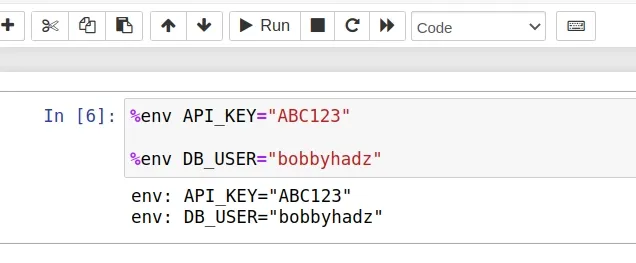
Magic commands start with % when using the IPython kernel.
The %env command is used to get, set and list environment variables.
You might also see the following syntax used to set environment variables.
%env API_KEY "ABC123" %env DB_USER "bobbyhadz"
Separating the key and value with a space or an equal sign works in the same way.
The code sample above shows how to set the API_KEY and DB_USER environment
variables.
Note that environment variables always store strings, so even if you set an environment variable to an integer, it would automatically get converted to a string.
%env MAGIC_NUMBER=100 %env MAGIC_NUMBER
Running the code produces the following output.
'100'
Notice that the output is wrapped in quotes.
# Setting a value of an environment variable using expansion
You can also use the %env var=$val syntax to set the value of an environment
variable using expansion.
name = "bobby" + "hadz" %env API_KEY="ABC123" %env DB_USER=$name
The code sample replaces the $name expression with the actual value of the
name Python variable.
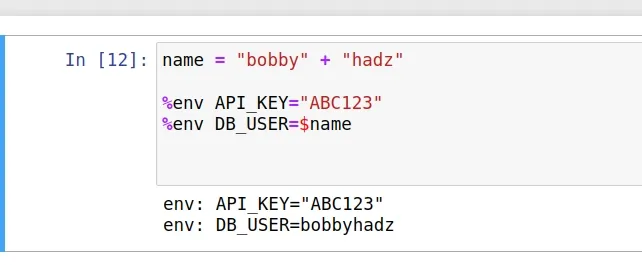
# List all environment variables using %env
If you need to list all environment variables and values, use the %env
command.
%env
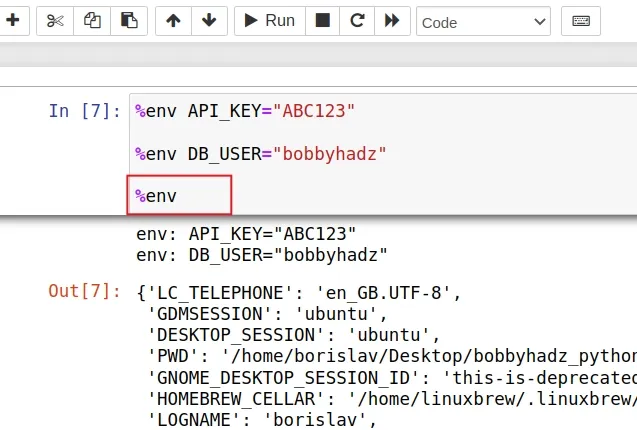
# Get the value of an environment variable
If you need to get the value of an environment variable, use the %env YOUR_VAR
command.
%env API_KEY="ABC123" %env DB_USER="bobbyhadz" %env API_KEY %env DB_USER %env DOES_NOT_EXIT
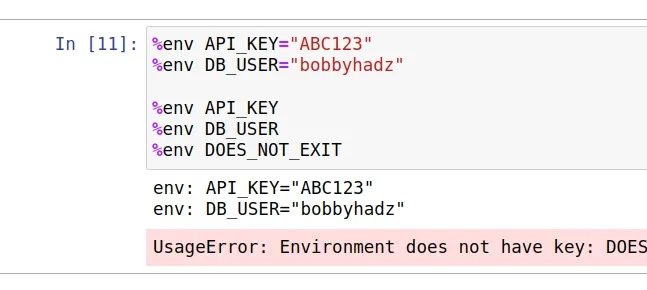
If you try to get the value of an environment variable that doesn't exist, the following error is shown:
- UsageError: Environment does not have key: DOES_NOT_EXIT
# Setting and accessing environment variables in Jupyter Notebook with os.environ
You can also use the os.environ mapping object to set and access environment variables in Jupyter Notebook.
import os # Set environment variables os.environ['API_KEY'] = "ABC123" os.environ['DB_USER'] = "bobbyhadz" # Access environment variables print(os.environ['API_KEY']) print(os.environ['DB_USER'])
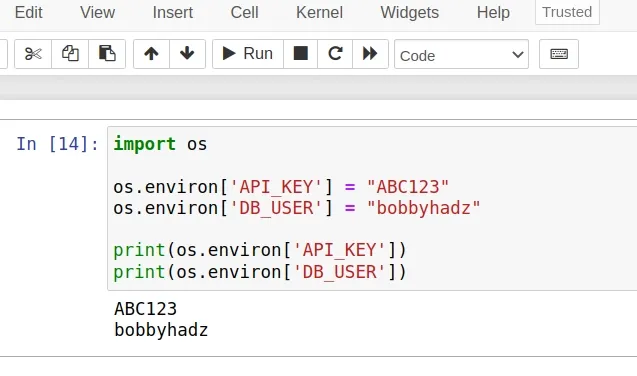
The first two lines set the API_KEY and DB_USER environment variables.
The second two lines print their values.
Make sure to
import the os module,
otherwise, you'd get a NameError.
Note that environment variables must be strings.
If you have a variable that stores an integer, use the str class to convert it to a string.
import os os.environ['API_KEY'] = "ABC123" os.environ['DB_USER'] = "bobbyhadz" # 👇️ Convert the value to String before setting ENV VAR os.environ['MAGIC_NUMBER'] = str(100) print(os.environ['API_KEY']) print(os.environ['DB_USER']) print(os.environ['MAGIC_NUMBER'])
Output:
ABC123 bobbyhadz 100
When using square brackets to access environment variables, you would get a KeyError exception if the environment variable is not set.
You can use the dict.get method to return a default value instead of raising
an error.
import os os.environ['API_KEY'] = "ABC123" os.environ['DB_USER'] = "bobbyhadz" print(os.environ.get('API_KEY', 'default value')) print(os.environ.get('DB_USER', 'default value')) print(os.environ.get('DOES_NOT_EXIST', 'default value'))
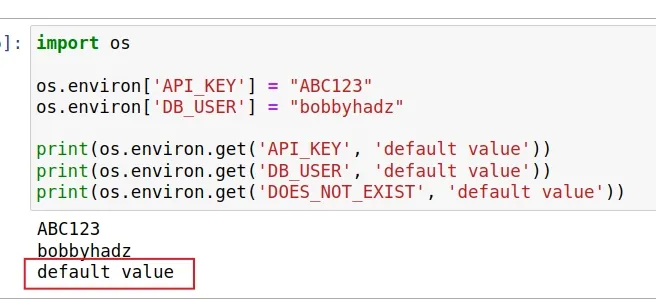
The third environment variable is not set, so the supplied default value is returned.
If you simply want to return None if the environment variable is not set, only
pass a single argument to the dict.get() method.
import os print(os.environ.get('DOES_NOT_EXIST')) # 👉️ None
The dict.get() method returns the value for the given key if the key is in the
dictionary, otherwise a default value is returned.
The method takes the following 2 parameters:
| Name | Description |
|---|---|
| key | The key for which to return the value |
| default | The default value to be returned if the provided key is not present in the dictionary (optional) |
If a value for the default parameter is not provided, it defaults to None,
so the get() method never raises a KeyError.
If you need to check if an environment variable is set, use the in operator.
import os os.environ['API_KEY'] = "ABC123" os.environ['DB_USER'] = "bobbyhadz" if 'API_KEY' in os.environ: # 👇️ This runs print('The API_KEY environment variable exists') else: print('The API_KEY environment variable does NOT exist')
# Using the python-dotenv package to set environment variables in Jupyter Notebook
You can also use the python-dotenv module to set environment variables in Jupyter Notebook.
Run the following command in a cell to install the module.
!pip install python-dotenv
Alternatively, you can run one of the following commands from your terminal.
pip install python-dotenv pip3 install python-dotenv
Now create a .env file in the root directory of your project and set some
environment variables.
API_KEY="ABC123" DB_USER="bobbyhadz" DB_PORT=1234
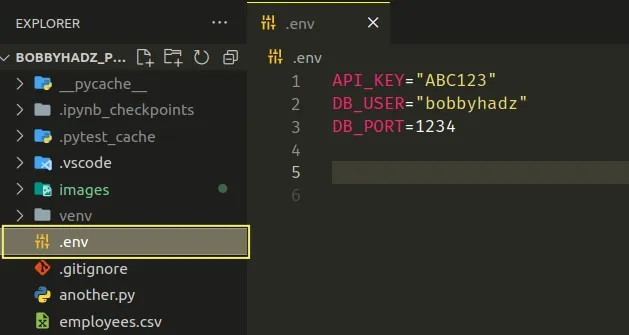
Now you can import and use the dotenv module as follows.
import os from dotenv import load_dotenv # Load the environment variables from .env load_dotenv() # Access the environment variables print(os.environ.get('API_KEY')) print(os.environ.get('DB_USER')) print(os.environ.get('DB_PORT'))
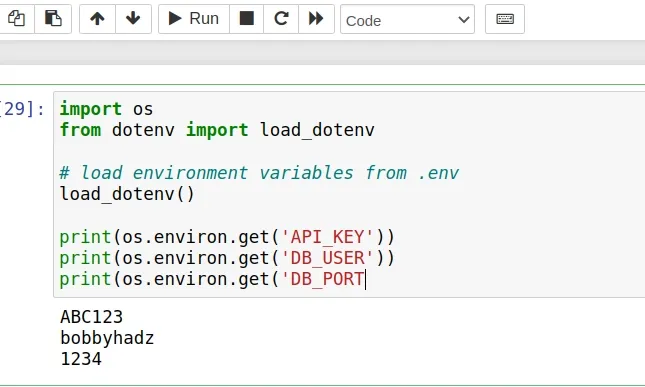
# Additional Resources
You can learn more about the related topics by checking out the following tutorials:
- Error executing Jupyter command 'notebook': [Errno 2] No such file or directory
- VS Code: Change Python version & select correct Interpreter
- How to check your Python version in Jupyter Notebook
- Error executing Jupyter command 'notebook': [Errno 2] No such file or directory
- jupyter is not recognized as an internal or external command
- Wrap code/text into multiple Lines in Jupyter Notebook
- The purpose of the exclamation mark (!) in Jupyter Notebook
- How to show (or hide) the Line Numbers in Jupyter Notebook
- How to display Directory & File structure in Markdown Files
- Display images Side by Side in GitHub Markdown (README.md)
- How to Clear Cell Output in Jupyter Notebook
- How to display Lists as a Table in Jupyter Notebook
- How to show a PIL Image in Jupyter Notebook
- How to measure Cell execution Time in Jupyter Notebook
- [Solved] Jupyter Notebook not running code Stuck on In [*]
- Pycharm does not show a Matplotlib Plot issue [Solved]
- Jupyter Notebook 500: Internal Server Error [Solved]
- IOPub data rate exceeded in Jupyter Notebook [Solved]
- Jupyter Notebook "Not Trusted" issue [Solved]
- ValueError: Expected object or value with
pd.read_json() - Jupyter Notebook not saving: '_xsrf' argument missing from post
- ssl.SSLError: [SSL: WRONG_VERSION_NUMBER] wrong version number (_ssl.c:1002)
- Import a Jupyter ipynb file from another ipynb file

